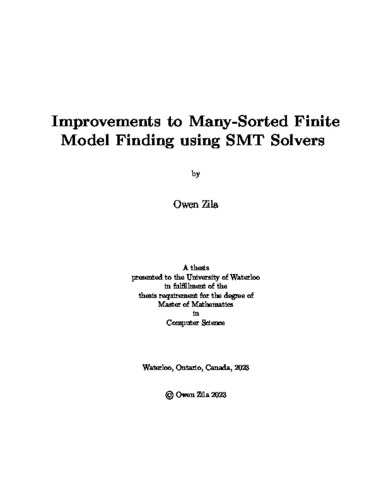| dc.contributor.author | Zila, Owen | |
| dc.date.accessioned | 2023-08-17 13:02:18 (GMT) | |
| dc.date.available | 2023-08-17 13:02:18 (GMT) | |
| dc.date.issued | 2023-08-17 | |
| dc.date.submitted | 2023-08-09 | |
| dc.identifier.uri | http://hdl.handle.net/10012/19701 | |
| dc.description.abstract | Formal modeling is a powerful tool in requirements engineering. By modeling a system before implementation, one can discover bugs before they appear in testing or production. Model finding (or instance finding) for a model written in first-order logic is the problem of finding a mapping of variables to values that satisfies a model's specifications. Unfortunately, this problem is undecidable in general. Finite model finding, the problem of finding a mapping of variables to finite sets of values, is decidable. Thus, finite model finding enables the automated verification of models at certain scopes (the number of elements in the domain of discourse of the problem). While finitizing a problem makes it solvable, as the scope of the problem increases, the problem can quickly become prohibitivly expensive to solve. Therefore, it is important to choose an efficient encoding of the problem for satisfiability (SAT) or satisfiability modulo theories (SMT) solvers when finitizing a problem.
We propose improvements to encodings of many-sorted finite model finding problems for SMT solvers. We propose new encodings for finite integers and transitive closure.
The key contributions of this thesis are that we:
- Formulate Milicevic and Jackson's method for preventing overflows in integer problems using bitvectors as a transformation from/to a many-sorted first-order logic formula and extend it to support additional abstractions present in MSFOL
- Propose an integer finitization method, called overflow-preventing finite integers (OPFI), that produces results closer to unbounded integers than Milicevic and Jackson's method, improving the correctness of the finitization with respect to the same problem over unbounded integers
- Demonstrate that OPFI solves problems faster than our encoding of Milicevic and Jackson's method in an SMT solver, and does not solve problems significantly slower than unchecked (pure) bitvectors
- Propose and prove the validity of negative transitive closure, an encoding of the transitive closure operator over a finite scope in first order logic for a special case of the use of transitive closure where pairs are only checked to not be in the transitive closure of a relation
- Generalize existing encodings of transitive closure to relations of arity greater than~two
- Demonstrate our new encoding of transitive closure performs faster than or as fast as existing encodings on models generated from Alloy models | en |
| dc.language.iso | en | en |
| dc.publisher | University of Waterloo | en |
| dc.subject | Alloy | en |
| dc.subject | formal methods | en |
| dc.subject | model checking | en |
| dc.subject | SMT-LIB | en |
| dc.subject | satisfiability modulo theories | en |
| dc.title | Improvements to Many-Sorted Finite Model Finding using SMT Solvers | en |
| dc.type | Master Thesis | en |
| dc.pending | false | |
| uws-etd.degree.department | David R. Cheriton School of Computer Science | en |
| uws-etd.degree.discipline | Computer Science | en |
| uws-etd.degree.grantor | University of Waterloo | en |
| uws-etd.degree | Master of Mathematics | en |
| uws-etd.embargo.terms | 0 | en |
| uws.contributor.advisor | Day, Nancy A. | |
| uws.contributor.affiliation1 | Faculty of Mathematics | en |
| uws.published.city | Waterloo | en |
| uws.published.country | Canada | en |
| uws.published.province | Ontario | en |
| uws.typeOfResource | Text | en |
| uws.peerReviewStatus | Unreviewed | en |
| uws.scholarLevel | Graduate | en |

